非谓语动词用法讲解过去分词用法共25页
过去分词的用法非谓语动词的用法讲解课件

学习方法建议
理论与实践相结合
通过例句和实际语境理解过去分
词和非谓语动词的用法,多做练
习,加深理解和记忆。
01
对比学习
02 对比现在分词、不定式等其他非 谓语动词的用法,找出异同点, 加深对非谓语动词的理解。
积累例句
多收集有关过去分词和非谓语动
词用法的例句,通过模仿和运用,
03
提高语言表达能力。
反思与修正
动名词作为主语、宾语和表语
01
02
03
动名词作为主语
动名词可以作为主语,表 示一个正在进行或已经完 成的动作,如 "Reading books is a good habit."。
动名词作为宾语
动名词可以作为动词宾语, 表示动作的对象或内容, 如 "I enjoy reading books."。
示例
The meeting ended up with a round of applause.(固定搭配 “end up with”表示“以……结束”)
07
练习与巩固
单项选择题
考察基础概念
单项选择题主要考察学生对过去分词非谓语动词基础概念的理解,包括其定义、 形式和用法等。
填空 题
检验知识应用
不定式作为表语
不定式作为补足语
不定式可以作为表语,表示主语的性质、 状态或特征,如"The best way to solve this problem is to communicate with them."。
不定式可以作为补足语,补充说明主语或 宾语的性质、状态或特征,如"He is to be married next month."。
非谓语的用法总结

非谓语动词的用法总结李靖非谓语动词(不定式、动名词、分词)不是真正意义上的谓语动词,在句中都不能单独作谓语.但都具有动词的某些特点,可以有自己的宾语或状语,构成非谓语动词短语.不定式表目的,表将来;动名词表主动,表进行;过去分词表被动,表完成. 一.作主语( 动名词、不定式、过去分词前面加being, 动名词做主语谓语动词用单数)1)不定式、动名词都可做主语,但是动名词做主语多指抽象的概念性的动作,可以是多次的经常的行为;不定式多表示具体的动作,尤其是某一次的动作.如:Playing with fire is dangerous. 玩火危险.(泛指玩火)To play with fire will be dangerous. 玩火会发生危险.2)用动名词做主语的句型:It’s no use/no good/pleasure doing sth 做.......没有用处/好处/乐趣It’s a waste of time doing sth 做.... 浪费时间It is worth doing sth 值得做某事It is no use crying over spilt milk. 覆水难收It is worth making an appointment before you go. 去之前预约一下是值得的.3)不定式做主语的句型.It is + adj +for sb to do sth.比较:表示人的品质时只能用of sb 如considerate/kind/nice/foolish/stupid/rude/cruel/wise/clever/brave/selfish/crazy/good/careful/careless/impolite/right/wrong等单词出现时.It is silly of you to say so.It is important for us to learn English well.It is a must/ a necessity for us to have a good command of the English language.4) “Wh- + to 不定式”可做主语.如:When to leave hasn’t been decided yet.什么时候动身还没定呢.Whether to drive or take the train is still a problem.是自驾车还是乘火车仍是一个问题.5)一般情况下,不定式和动名词作主语,谓语动词一般用单数形式.如: Seeing is believing.= To see is to believe 眼见为实.. Planting flowers needs constant watering.但and连接的多个动名词作主语,谓语动词大多用复数(如果前后动名词的语义一致,谓语一般用单数).如:Lying and stealing are immoral. 说谎与盗窃是不道德的.6) 动名词前面可以加上形容词性物主代词构成动名词的复合结构.如:----- What made him angry------ Mary’s /My/His/Her /Their/ The boy’s/ The president’s being late(made him angry.7)过去分词不能单独做主语,前面必须加上being,构成动名词,做主语.如:.Being examined twice a year , whether it is a car, a bus or a truck,.经典练习:1.It’s important for the figures_________ (update) regularly.2.No matter how bright a talker you are, there are times when it’s better ______(remain) silent.3.It’s really stupid of you _______ (tell)him the news yesterdayso it has been disturbing him all the time.4.___________(understand)your own needs and styles of communicationis as important as learning to convey your affection and emotions.5.__________(worry) about your grades doesn’t help.6.The engine just won’t start. Something seems _____ (go) wrong withit.参考答案:1. to update 2. to remain 3. to have told 4.understanding 5. worrying go改错题:一个句子最多有一处错误1. It’s standard practice for a company like this one employ a security officer.2. Hear how others react to the book you have just read creates an added pleasure.3. Know basic first-aid techniques will help you respond quickly to emergencies.4. Do well in an interview will be an important part of getting a place at university.told us whether have a picnic was still under discussion.prevent them from swimming in this river is a problem.参考答案:1. 在employ前加to 2. Hear 改为Hearing 3. Know 改为Knowing4. Do 改为Doing5. have 前加to6. prevent 前加to.二.作定语1)作定语的不定式如果是不及物动词,或者不定式所修饰的名词或代词是不定式动作的地点、工具等,不定式后面需要有相应的介词,如:The Browns have a comfortable house to live in2) 用不定式作定语的几种情况:a. 不定式表将来如:The car to be bought is for his sister.b. 用来修饰被序数词、最高级或no, all, any,the only 等限定的中心词,且与中心词为逻辑上的主动关系, 如:He was the best man to do the job.She was the first woman to win the gold medal in the Olympic Games.c. 有些名词的同根词常跟不定式,因而它们也常跟不定式做定语,常见的有:promise, plan, attempt, offer, decision, refusal, failure, ability, chance, warning, anxiety, eagerness, willingness, readiness等I don’t trust his promise to come for a visit.He said he had no plan to go there.He made an attempt to stand up.Birds’singing is sometimes a warning to other birds to stay away.3) 前置定语:V+ing 可以表示正在进行,也可以表示特征;过去分词表示已经完成或状态请区别下面短语:the boiling/ boiled water. 正沸腾的水(表正在进行)/白开水(表完成)a good-looking flower. 一朵好看的花儿(表特征)the developing countries/ the developed countries 发展中国家/发达国家the falling leaves / the fallen leaves正在下落的叶子/落叶the remaining money/ the money left 剩下的钱注意:英语中有些表示感觉的动词,其现在分词形式表示“令人感到…..的”,过去分词形式表示“感到….的”如:an exciting voice 一个令人兴奋的声音 an excited voice 一个兴奋的声音a puzzling expression 一个令人困惑的表情 a puzzled expression 一个困惑的表情4)区别下列后置定语的用法:to be done 表示被动、将来;done 表示被动、完成;being done 表示被动、正在进行;v+ing 表示主动;动词的系表结构直接去掉动词be;如果是不及物动词或者是感官系动词sound/taste/ feel/ smell/ look 和变化系动词就只有用V+ing形式.Have you read the novel written by DickensListen The song being sung is very popular with students.The question to be discussed at tomorrow’s meeting is a very important one.The food tasting delicious sells well.注意:不定式在后置定语中只表示将来,不表目的;having dong 或者having been done 一般用在状语中,不可以做后置定语,过去分词本身就表被动和完成.请完成下面的练习are many people ______ (wait) outside the hall.are many problems ______ ( remain) to be solved.flowers _______ (smell) sweet attract a lot of people.are many people _______ (invite) to the party.film, ______ (set) in the 19th century, won the medal.meeting_________(hold) now is of great importance.meeting_________(hold) yesterday was of great importance.meeting ________ (hold) tomorrow is of great importance.is always the first_______ (come) and the last _______ (leave).is the only person ________(know) the truth.was the best ______ (do) the job.13. A great number of students _________(question) said they were forcedto practice the piano.14. John has really got the job because he showed me the official letter_____(offer) it to him.15. After completing and signing it, please return the form to us in theenvelope ______ (provide)16. Birds’singing is sometimes a warning to other birds ______(stay)away.17. The room is empty except for a bookshelf_____(stand)in one corner.18. Laura was away in Paris for over a week. When she got home, therewas a pile of mail______(wait) for her.19. They might just have a place _____ (leave) on the writing course—whydon’t you give it a try20. In some languages, 100 words make up half of all words ____(use) indaily conversations.21. Volunteering gives you a chance _______ (change) lives, includingyour own.参考答案: . smelling 5. set held 8. to be held 9. to come 10.to leave know do 13. questioned 14. offering 15. provided16. to stay 17. standing 18. waiting 19. left 20. used 21.to leave 22. to change三.作表语(不定式/动名词/过去分词都可以做表语)1.动名词作表语表示抽象的概念性的动作,可以是多次的经常性的行为;不定式多表示具体的动作,尤其是某一次的动作例如:比较下列区别His favorite sport is swimming. (泛指游泳)Your task today is to wash the curtains.(指一次具体的工作)2 .excited/disappointed/frightened/pleased/satisfied/interested/puz zled/tired 感到…exciting/disappointing/frightening/pleasing/satisfying/interestin g/puzzling/tiring令人….He is moved by the moving movie.The film is moving.It is a pleasant trip.(pleasant 做前置定语)The trip is pleasing.(pleasing 做表语)3. 注意下列表达方式:My bag is missing/ lost/ gone. I find my bag missing/lost/gone.4. remain 的表语1) remain to be done 仍需去做/有待于…One problem remians to be solved.It remians to be seen whether the operation was successful.2) remain做“仍然是”讲时,可用名词,adj,介词,现在分词或者过去分词作表语He remained stuck (滞留)abroadPeter became a manager, but Jack remained a worker.Whatever achievements you’ve made, you should remain modest.无论你取得多么大的成就,你都该保持谦虚.He had to remain in hospital until he was better. 他不得不一直住院直到身体好些.This solid stone,square tower had remained standing for one thousand years.The guests came in, but she remained sitting/seated at the desk reading.客人们都来了,但她还坐在写字台旁读书.As before, he remained unmoved. 他和以往一样无动于衷.注意:1)用作不及物动词,意思是“剩下;剩余;遗留”,此时不能用进行时态,也没有被动语态.After the fire, very little remained of his house. 火灾过后,他的家所剩无几.2)remaining是形容词,意为“剩余的”,常作前置定语;而left则只能作后置定语.例如:There are still some apples left. 还剩余一些苹果. I bought a giftfor her with the remaining money. 我用剩余的钱给她买了一件礼物.3) remain作名词时表示“剩余物”,一般用其复数形式.例如:The archeologists found some remains of the Song Dynasty.考古学家发现了一些宋代遗迹.5. 1)主语+seem +(to be )+表语,表语多为名词或形容词Tom seems (to be ) a very clever boy. 汤姆看上去是一个非常聪明的男孩.The man over there seems to be a new teacher. 那边的那个人看上去像一个新老2) 主语+ seem to do sthbe doing sthhave done sthMrs. Green doesn’t seem (或seems not ) to like the idea. 格林夫人似乎不太喜欢这个主意.The children seemed to be eating something in the room. 孩子们好像正在房间里吃东西呢.The young man seemed to have changed much. 这个年轻人看起来变化很大.6. 当不定式用作表语时,其中的 to 原则上是不能省略的.如:His aim is t o do two years’ work in one. 他的目标是一年干两年的工作.但有一种例外,那就是当主语部分有动词do的某种形式时,用作表语的不定式可以省略to.如:What you first do is (to) mix the egg with flour. 你先得把鸡蛋和面粉和好.All I did was (to) touch the window, and it broke. 我只不过碰了一下窗户,玻璃就碎了经典练习1. My worry is your _______ (rely) too much on your parents.2. Please remain ______ (seat); the winner of the prize will be announced soon.3. For those with family members far away, the personal computer and thephone are important in staying________( connect)答案:四.作宾语(不定式和动名词都可以作宾语)1.只能用动名词作宾语的动词和短语考虑、建议和原谅,承认、推迟没得想像避免、继续练,否认完成停感谢不禁止介意准逃亡consider(考虑);advise/suggest/propose/recommend(建议);excuse/pardon(原谅);admit/acknowledge(承认);delay/postpone/put off(推迟); imagine/fancy(想像);avoid(避免);practise(练习);deny(否认);finish(完成); appreciate/acknowledge(感谢); forbid (禁止); mind(介意); escape(逃脱);此外,这些动词也跟动名词:miss(错过);enjoy(享受);risk (冒险);tolerate/bear/stand/put up with(容忍);quit(停止)advocate(提倡);resist (抵制)understand(理解);allow/permit(允许)feel like doing sth(喜欢做某事; give up doing (放弃做某事); keep doing(不停的做某事); be busy doing sth; can’t help doing sth(情不自禁); be worth doing sth (值得做某事);have difficulty/trouble doing sth(做...有困难/麻烦); have a hard/good time doing sth做.... 很开心/不开心; have fun doing sth 做.... 很开心 succeed in doing sth 成功做某事It is no use/good /pleasure doing sth做.......没有用处/好处/乐趣There is no point in doing sth= There is no need to do sth 没必要做某事It’s a waste of time doing sth 做.... 浪费时间It is worthwhile doing/ to do sth = be worthy to be done= be worthy of being done= be worth doing sth值得做某事2.只能用不定式作宾语的动词决心学会想希望,拒绝设法愿假装主动答应选计划,同意请求帮一帮decide/determine, learn, want, expect/hope/wish, refuse, manage, care, pretend, offer, promise, choose, plan, agree, ask/beg, help,(afford, strive, happen, wait, threaten口诀之外的单词)She pretended not to see me when I passed by.We agreed to meet here but so far she hasn’t turned up yet.3. forget,go on,mean,regret,remember,stop,try等动词或词组可带动名词或不定式作宾语,但意义上有区别.forget to do sth _________________ forget doing sth ______________________ go on to do sth __________________go on doing sth ______________________ mean to do sth____________________ mean doing sth___________________ regret to say/tell/inform/announce__________________________________ regret doing sth/having done________________________________________ remember to do sth_________________ remember doing sth________________ stop to do sth______________________ stop doing sth____________________ try to do sth______________________ try doingsth_________________________can’t help (to) do sth __________________ can’t help doing sth__________________can’t help but do sth =can’t but do sth ___________________sb used to do sth ___________________ sb be used to doing sth____________________sth be used to do sth ________________________be afraid to do sth不敢做某事 be afraid of doing sth担心发生某事be sure to do sth一定会.....be sure of doing sth确信会.....Let’s go on studying Lesson 6. (让我们继续学第六课.说明前面已学了一部分.)Let’s go on to study Lesson 6. (让我们接着学第六课.说明前面已学了第五课.)I remember doing the exercise. (我记得做过练习.)I must remember to do it. (我必须记着做这事.)I tried not to go there. (我设法不去那里.)I tried doing it again. (我试着又干了一次.)Stop speaking. (不要讲话.)He stopped to talk. (他停下来讲话.)I mean to come early today. (我打算今天早些来.)Missing the train means waiting for another hour.(误了这趟火车意味着再等一个小时)4.在allow,advise,forbid,permit等动词后直接跟动名词形式作宾语,如果后面有名词或代词作宾语,其后用动词不定式作宾语补足语:allow /advise/forbid/permit sb to do sthallow/advise/forbid/permit doing sthWe don’t allow smoking here.We don’t allow students to smoke.动词need,require,want作“需要”解,其后必须用动名词的主动形式或不定式的被动形式作宾语表示事情需要做,这时,动名词的主动式表示被动意义.be worth 后必须用动名词的主动形式来表示被动意义.…需要….…值得….deserve to be done/ doing …..值得….The window needs/requires/wants cleaning/to be cleaned.Her method is worth trying.These proposals deserve considering/ to be considered. 这些建议应该被考虑.devote oneself/ one’s time to (把...贡献给...);look forward to (期望);pay attention to (注意); attach importance to (重视); be used/accustomed to (习惯于做某事);when it comes to (当谈到做某事) ; get down to(着手);prefer doing sth to doing sth(喜欢...而不喜欢; turn to doing sth(转向);thanks to (多亏); lead to (导致);the key to doing sth (做某事的关键);object to/be opposed to (反对);contribute to (有助于);be addicted to doing sth (沉湎于;对...上瘾);make contributions to (对...做出贡献) ;due to (由于);apply oneself to (致力于) ;stick to(坚持);come close to (接近于)等后的动词也必须用动名词形式,例如:I look forward to hearing from you soon.6.不定式做动词(词组)tell, show, understand, explain, teach, learn, advise, discuss, ask, decide, wonder, find out 等的宾语时,前面常常带引导词how, what, whether, where, when, who等,但是why后加不带to的不定式.He showed us how to do the work= He showed us how we should do the work.I don’t know what to do= I don’t know what I should do.We must decide whether to stay or go= We must decide whether we’ll stay or go.Can you tell me why do it7.在love,hate,prefer,like等动词后用动名词或不定式无多大区别.有时用动名词作宾语时,指一般情况,而跟不定式作宾语时指某一具体行为.I love swimming. I love to swim today.,begin,continue在书面语中多后接动名词,在口语中多后接不定式.It started to snow. He is beginning to cook dinner. I began to understand what he meant.典型例题1. David threatened _____(report) his neighbor to the police if the damages were not paid.2. He chose _______(keep) silent when asked why.3. He volunteered _________(help) the victims in the earthquake.4. Whenever you are in trouble, don’t hesitate _______(ask) me for help.5. As a result of the serious flood, two-thirds of the buildings in the area need ______(repair).6. —Can I smoke here—Sorry. We don’t allow ______(smoke) here.7. I hear they’ve promoted Tom, but he didn’t mention ______(promote) when we talked on the phone.8. Bill suggested _______(hold) a meeting on what to do for the Shanghai Expo during the vacation.9. I really appreciate _______(have) time to holiday with you on this nice island.10. I can hardly imagine her _______(marry) such a men as Lee.11. It’s quite hot today. Do you feel like ________(go) for a swim12. The film star wears sunglass. Therefore, he can go shopping without ______(recognize).13. —They are quiet, aren’t they—Yes, they are accustomed to not talk at meals.14. How can I afford to fly to America when I can only earn 800 Yuan a month.15. Would you mind turn down your radio a little, please16. The squirrel was lucky that it just missed caught.17. He practiced playing the piano every morning.18. He risked losing his life in order to save the drowning girl.19. He was considering changed his mind.20. He was considered to be very rich.21. D on’t worry. We can manage to help you out.22. I was advised to quit the job and try a new one.23. We’ve had a good start, but next, more work needs to be done to achieve the final success.24. One learns a language by making mistakes and correct them.25. China recently tightened its waters controls near the HuangYan Island to prevent Chinese fishing boats from attacked in the South China Sea.26. Shortly after suffering from a massive earthquake and having reduced to ruins, the city took on a new look.27. When it comes to speak in public, no one can match him.28. Lydia doesn’t feel like study abroad. Her parents are old.29. I really regret _____ (inform) you that you have failed to pass the exam.30. He tried ______(persuade) her to accept their incitation, but in vain.31. She was afraid to step further in grass because she was afraid of being bitten by a snake.32. I still remember taken to the Famen Temple and what I saw there.33. No one answered the front door, so I tried knocking at the back door.34. I’m afraid I can’t help painting the house this afternoon.35. I couldn’t choose but to accept his invitation.36. I’m sorry. I didn’t mean hurt you.37. Now that we have finished Exercise I, let’s go on to do Exercise Ⅱ.38. I couldn’t help but admiring him for his courage.39. Oh, my goodness I forgot to lock the door last night. Is there anything missing40. I forgot paid already, so I went to my boss again.41. The competitor never dreamed of there __________ (be) a chance for him to win the first prize in the 100 meter race.42. Have you heard of my sister _______ (win) the contest43. The doctor does not mind I eating a little meat occasionally.44. She didn’t mind her books taken away and used by other students.45. I insist on Mary go there.46. I knew nothing about the window was open.47. He left the city without our know it.答案:report 2. to keep 3. to help ask been promoted 10. marrying recognized 改为taking 14.正确改为turning 前加being 17.正确 18.正确改为changing 20.正确 21.正确 22.正确 23.正确改为correcting 前加being 改为being 改为speaking 改为studying inform persuade 31.正确前加being 33.正确改为paint 35.去掉to 36.正确 37.正确 39.正确前加being 改为my或me 前加being 改为going,或去掉on 改为being 改为knowing五.作状语不定式分词作状语时,不定式、分词的逻辑主语必须与句子的主语保持一致,不定式表示目的,动名词表示主动,过去分词表示被动.(一)不定式作状语1.不定式作目的状语In order to可以放在句首,也可以放在句中;so as to 只能放于句中,in order to 和so as to 放于句中时,不能用逗号隔开.To catch the early bus/In order to catch the early bus, he gets up early.= He gets up early to catch the early bus.Bob took down my telephone number so as / in order not to forget it. = In order not to forget it, Bob took down my telephone number.2.不定式作结果状语不定式作结果状语常用在下列句式中:so+adj +as to do sth; such+n +as to do sth; …enough to do sth; too….to; Only to do sth表示不定式出乎意料的结果.I’m not so stupid as to write it down.=I’m not such a fool as to write it down.He is clever enough to be fit for the job.Jane arrived at the station only to be told the train had gone.比较:He died, leaving only debts.(动名词表示自然而然的结果)I’m too tired to stay up longer.注意:only too…to结构中,并非是“太….而不能….”之意,而表示“非常….”这样搭配的形容词有:pleased, ready, willing, glad, happy等.I’m only too glad to have passed the exam.考试及格了,我非常高兴.I’m too willing to help you.3.不定式作原因状语当这些形容词light, heavy, hard/difficult, easy, comfortable, pleasant, dangerous impossible, interesting nice等出现时要用主动表被动.This question is easy to answer.This book is difficult to understand.(二)分词做状语分词作状语时,可以表示时间、原因、结果、条件、让步、伴随状语等,为了强调,可以与while, when, once, if , unless等连词连用.(not)V+ing 表示句子主语之间为逻辑上的主动关系V+ed 表示句子主语之间为逻辑上的被动关系(not) having done 表示句子主语之间为逻辑上的主动关系;动作发生在谓语动作之前(not)having been done表示句子主语之间为逻辑上的被动关系; 动作发生在谓语动作之前1. When ________ (offer) help, one often says “Thank you”or “It’s kind of you.(Separate) from other continents for millions of years, Australia has many plants and animals not found in any other country in the world.3. Generally speaking, if _______(take) according to the directions, the drug has no side effect.4. He glanced at her, ________( note) that though she was tiny, she seemed very well.5. The teacher came into the lab, _________(follow) by some students.6. _________________(tell) many times, he still repeated the same mistake.7. Not _______________(receive) her letter, he wrote again.参考答案: 2. Separated 3. taken 4. noting 5. followed 6. Having been told7. having received(三) 独立成分作状语有些分词或不定式短语作状语,其形式的选择不受上下文的影响,称作独立成分.常见的有:generally speaking 一般来说 strictly/ honestly/frankly speaking 严格地、诚实地、坦率地讲considering/ given/taking… into consideration 考虑到judging from/by 根据....判断compared with/to 与....相比provided/ providing/ suppose/ supposing/ assuming 假设to be frank/ to tell you the truth/ to be honest 坦率地说、跟你说实话、老实说To make things/ the matter worse 更为糟糕的是seeing that 鉴于Considering his age, he is quite tall.Judging from his look, he didn’t agree with you at all.I lost my way in complete darkness and, to make things worse, it began to rain.To tell you the truth, I am a little tired.练习:1).______ (sleep) late in the morning, he turned off the alarm o’clock.2)._______(see) from the hill, the park looks very beautiful.3) ._______(see) the sunset from the hill, he felt relaxed.4). _______(clean) the desks, we began reading.5).__________(surround) for a month, the enemy had to give in.6). ___________(lose) in the woods, he finally saved by the police.7) .All the afternoon he worked with the door_______(lock).8).With winter_______(come) on,it's time to buy warm clothes.9).I can't go out with all these dishes________(wash).10).Anderson was lying on the bed with the window________(open).11).He stood there with his eyes ______(fix) on the wall.12).He felt relaxed, with his work _______(do).13). He felt anxious, with a lot of work________(do)参考答案:1) to sleep; 2) seen; 3) seeing; 4) Having cleaned; 5) having been surrounded; 6) lost7) locked 8) coming 9) to wash 10) open 11).fixed 12) done 13) to do总结状语从句的做题方法:(四)独立主格非谓语动词作状语时,它的逻辑主语应该和句子主语保持一致.但是有时非谓语动词带有自己的逻辑主语,在句子中做状语,我们称之为独立主格.它的结构特点是:①独立主格中的状语有自己独立的主语,与主句的主语不同,前后主语不一致;②在独立主格中的状语中,不定式表示还未作,过去分词表示被动;现在分词表示主动③独立主格结构一般都有逗号与主句分开. 独立主格的结构为:(with)主语+V+ing/v+ed/ to do sth/ adj/ 介词结构/ 副词1).名词/主格代词+现在分词.名词/主格代词与现在分词之间主谓关系.如:The girl staring at him (= as the girl stared at him), he didn’t know what to say.= With the girl staring at him, he didn’t know what to say.姑娘两眼望着他,他不知道说什么好.Time permitting (= if time permits), we will go for an outing tomorrow.= _______________________________________________________如果时间允许的话,我们明天去郊游.2).名词/主格代词+过去分词.名词/主格代词与过去分词之间的动宾关系.如:The problems solved (= as the problems were solved), the quality has been improved.= With the problem solved, the quality has been improved.随着问题的解决,质量已经提高了. Her glasses broken (= because her g lasses were broken), she couldn’t see the words on the blackboard. =__________________________________________________________________.由于眼镜摔坏了,她看不见黑板上的字.3).名词/主格代词+不定式.名词/主格代词与不定式之间是主谓关系,且强调的是一次具体性的动作.如:He is going to make a model plane, some old parts to help.= He is going to make a model plane, with some old parts to help.借助于一些旧零件,他要做一个飞机模型.4).名词/主格代词+形容词.如:An air accident happened to the plane, nobody alive. 那架飞机遭遇了空难,无一人生还.= An air accident happened to the plane, with nobody alive.So many people absent, the meeting had to be called off. =_____________________________这么多人缺席,会议不得不取消.5).名词/主格代词+副词.如:He put on his sweater ,wrong side out.= He put on his sweater , with wrong side out.他把毛衣穿反了.The meeting over, they all went home.=____________________________________________.会议一结束,他们就都回家了.6).名词/主格代词+介词短语.如:The boy goes to the classroom, book in hand.= The boy goes to the classroom, with a book in his hand.那男孩手里拿着书去教室.Mary was sitting near the fire, her back towards the door. 玛丽靠近火炉坐着,背对着门. 7). There being +名词(代词),being不可省.如:There being nothing else to do, we went home. 没有别的事可做,我们就回家了.There being no further business, I declare the meeting closed. 没有再要讨论的事了,我宣布散会.8). It being +名词(代词),being不可省.如:It being Christmas, t he government offices were closed. 由于圣诞节的缘故,政府机关都休息.当不定式用作介词except或but的宾语时,该不定式有时带 to,有时不带 to,情形比较复杂,大致原则是:其前有do,不定式不带 to;其前没有 do,不定式通常带 to.如:He likes nothing except to watch TV. 除了看电视外,他什么都不喜欢.It had no effect except to make him angry. 除惹他生气外,没产生任何效果.There’s little we can do except wait. 除了等待我们没有什么办法.I could do nothing except agree. 我除了同意,没有别的办法重点句型:have no choice/alternative but to do sth 别无选择只能做某事 have nothing to do but do sth / can do nothing but do sth别无选择只能做某事经典例题:1.I looked up and noticed a snake ______(wind) its way up the tree to catchits breakfast.2.Before driving into the city, you are required to get your car_______(wash).3.Having finished her project, she was invited _______(speak) by the schoolto the new students.4.When we saw the road _______(block) with snow, we decided to spend theholiday at home.5.Let those in need ______(understand) that we will go all out to help them.6.He is thought ______(act) foolishly. Now he has no one but himself to blamefor losing the job.7.Alexander tried to get his work in the medical circles ______(recognize).8.I was advised _______(take) more exercise and eat less sugar.9.That eight-year-old boy was made _________(work) day and night by thecruel boss.10.When he went back to his home village ten years later, he found itcompletely _____(change).11.Passengers are permitted ______(carry) only one piece of hand luggageonto the plane.12.Simon made a big bamboo box _____(keep) the little sick bird till it couldfly.13.Listen Do you hear someone call for help14.I felt something hitting me on the back.15.Let the children quiet, please.16.He was heard leave the house.17.I’ll have him to pay attention to his handwriting.18.Don’t have the students study all day.19.All that set me thinking.20.He got his tooth pull out yesterday.21.He was caught steal in the shop and was sent to prison.22.I found my desk mate, Li Yang, play basketball on the playground.23.Michael put up a picture of Yao Ming beside the bed to keep himselfreminding of his own dreams.24.Even the best writers find themselves losing for words.25.Claire had luggage _______ (check) an hour before her plane left.26.I have a lot of readings ________ (complete) before the end of this term.27.Every year, Tom remembers to have some flowers ________ (send) to hermother on her birthday.28.The director had her assistant _______ (pick) up some hot dogs for themeeting.29.The two men had their lights ________ (burn) all night long.30.He had his house _______ (break) into last night.31.With the world changing fast, we have something new deal with all byourselves every day.32.Emperor Qin Shi Huang had all the walls join up.33.If he takes on this work, he will have no choice but meet an even greatchallenge.34.He had all his students to stand up and sing the song together.35.They had the machine run all day and all night.36.We won’t have such a thing happening again.37.Something has gone wrong with my computer. I’ll get it _________ (repair)tomorrow.38.It’s too noisy outside. I’ll have to get the children ___________ (stop)shouting.39.The first thing he did every morning was to get his car____________(start).40.He was very humorous and often got us ________ (laugh).41.Considering his illness, the doctor tried to get the patient stop smoking.42.His sudden appearance got them surprising.43.He got his ankle hurt in the game yesterday.44.The boss got them worked as soon as they entered the workshop.答案:1.winding 3. to speak 4. blocked 5. understand 6. to have acted 8. to take 9. to work 10. changed 11. to carry 12. to keep13. call改为calling 14. hitting改为hit 15. quiet前加be 16. leave 前加to 17.去掉pay前的to18.study改为studying 19. 正确 20. pull改为pulled 21. steal改为stealing改为playing 23. reminding改为reminded 24. losing改为lost 25. checkedcomplete 27. sent 28. pick 29. burning 30. broken 31. deal前加to 32. join改为joined33.meet前加to 34. 去掉to 35. run改为running 36. 正确 37. repaired38. to stop39.started 40. laughing 41. stop 前加to 42. surprising改为surprised43. 正确改为working。
非谓语动词的用法讲解过去分词的用法

2. Don’t speak until you are spoken to.
Until spoken to
2.原因状语
1. Because the boy was greatly touched by his teacher’s words, he did a lot of things to help his classmates.
have接过去分词作宾补有两种情况。 一、所表示的动作由他人完成。 (1) He had his money stolen.他的钱给偷了。 (被别人偷去了) 二、 所表示的动作由句中的主语所经历或者 遭受。如: (2) He had his leg broken.他的腿断了。 (自己的经历) 3.表示“希望”、“要求”的动词 want, wish, like等 I want the problem settled tonight. 我希望这个问题今晚能够得到解决
非谓语动词的用法讲解:
过去分词的用法
过去分词作表语 1. 及物动词的过去分词作表语,与句子主语是 被动关系,表示主语的状态,既表示被动, 又表示完成。 The cup is broken. 茶杯破了。 2. 不及物动词的过去分词作表语,与句子主语 是主动关系,表示主语的状态,只表示动作 的完成。 He is retired. 他已退休。
【注意】如果过去分词作状语时,前面再加 逻辑主语,主句的主语就不再是分词的逻辑 主语,这种带逻辑主语的过去分词结构实际 上属于独立主格结构。 (1) The signal given, the bus started. (the signal 是 given 的逻辑主语,因此主句 主语 the bus 就不是given 的逻辑主语。 (2) Her head held high, she went by. (her head 是 held high 的逻辑主语,因此 主句主语 she 就不再是held high 的逻辑主 语。)
高中英语 语法 非谓语动词 过去分词作宾语补足语 (共25张PPT)

② He won’t like such questions discussed at the meeting.
③ The readers wished the serial story continued.
1. Match the two parts to make sentences.
B. Entering; gone
C. To have entered; being stolen
D.
Having entered; to be stolen
5. We are pleased to see the problem ___. A. settled B. having been settled C. be settled D. settling
A. I wonder how B. I don’t wonder C. Sorry, it’s out of order. D. No wonder, here it is
17. ---How is everything going? ---________
A. Everything is finished B. Everything has been done C. Not so bad, you know D. Not doing wrong, you know
Choose the correct answers.
1.Because of my ____ English, I can’t make myself ______. A.broken; understood B. broken; understand C. break; understood D. breaking; understanding
过去分词作为非谓语动词的用法

过去分词作为非谓语动词的用法1、过去分词作定语Eg. We should pay attention to our spoken English.注:单个过去分词作定语常放在它所修饰的名词之前, 和它所修饰的名词存在动宾(被动)关系。
Eg. This is one of the schools built in 1980.= This is one of the schools which were built in 1980.注:过去分词短语常放在它所修饰的名词之后,与被修饰的名词之间存在动宾关系,相当于一个定语从句,但是更简洁。
2、过去分词(短语)作宾语补足语Eg. I found the small town changed a lot.Eg. He wants the letter typed right away.Eg. We must get our homework finished on time.3、过去分词作状语过去分词(短语)作状语,修饰谓语,常常表示时间、条件、原因、让步、伴随情况等,相当于对应的状语从句。
它和主句的主语存在动宾关系。
a、表示时间Eg. Seen from space, the earth looks blue.=When it is seen from space, the earth looks blue.b、表示条件Eg. Kept in refrigerator, these vegetables will remain fresh.=If they are kept in refrigerator, these vegetables will remain fresh.c、表示原因Eg. Deeply moved by the movie, the girls began to cry.=As they were deeply moved by the movie, the girls began to cry.d、表示伴随情况Eg. Shewalked out of the house, followed by her daughter.= She walked out of the house, and was followed by her daughter.e、表示让步Eg. Beaten by the enemy, he refused to let out the secret.=Although he was beaten by the enemy, he refused to let out the secret.4、过去分词(短语)作表语Eg. The children were satisfied with his explanation.Eg. She looked worried.练习题:1. —I ’m very thirsty.—You’d better drink some ___ water.A. boilingB. boilC. boiledD. to be boiled2. Please don’t forget him. He is one of ___.A. those invitedB. invited thoseC. those invitingD. inviting those3. The rooms are ____, so you can’t move in.A. paintedB. paintingC. being paintedD. to be painted4. As soon as he entered the city, he ____.A. was losingB. got losingC. lostD. got lost5. What he has done is really ____.Now his parentsare _____ him.A. disappointing; disappointed atB. disappointing; disappointed aboutC. disappointing; disappointed withD. disappointed; disappointing by6._____ a reply, he decided to write again.A. Not receivingB. Receiving notC. Not having receivedD. Having not received7. ____in her new skirt, she tried to make herself ____at the party.A. Dressed; noticedB. Dressing; noticedC. Dressed; noticingD. Dressing; being noticing8. ____ better attention, the vegetables could have grown betterA. GivingB. GivenC. GiveD. To give9. Unless ___ to speak, you should remain silent at the conference.A. invitedB. invitingC. being invitedD. having invited10.____ by his teachers, he has made great progress in his lesson.A. HelpingB. To helpC. HelpD. Helped11. ____his telephone number, she had some difficulty getting in touch with Bill.A. Knowing notB. Not knownC. Not knowingD. Not know12. The old man walked in the street, ____.A. following his sonB. followed his sonC. and following his sonD.following by his son13. ___ a white sweater, she looks much more beautiful.A. DressingB. wearingC. DressedD. Having dressed14. ___, the little boy is living a happy life.A. Taking good careB. Taken good careC. Having taken good careD. Taken good care of。
(完整word)非谓语动词现在分词和过去分词的用法
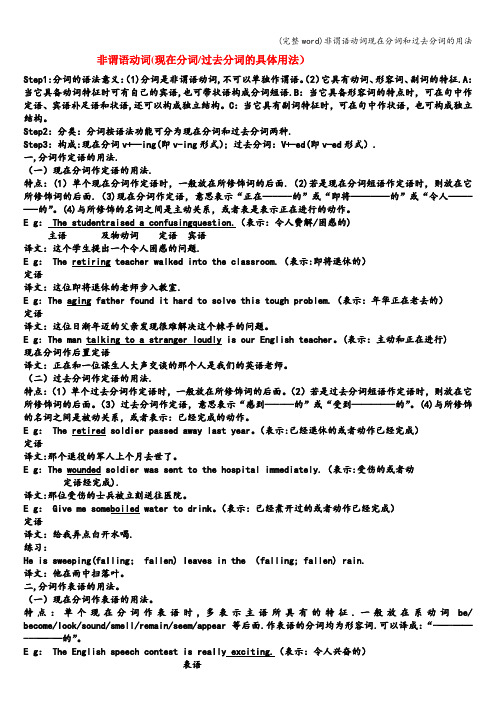
非谓语动词(现在分词/过去分词的具体用法)Step1:分词的语法意义:(1)分词是非谓语动词,不可以单独作谓语。
(2)它具有动词、形容词、副词的特征.A:当它具备动词特征时可有自己的宾语,也可带状语构成分词短语.B:当它具备形容词的特点时,可在句中作定语、宾语补足语和状语,还可以构成独立结构。
C:当它具有副词特征时,可在句中作状语,也可构成独立结构。
Step2:分类:分词按语法功能可分为现在分词和过去分词两种.Step3:构成:现在分词v+—ing(即v-ing形式);过去分词:V+-ed(即v-ed形式).一,分词作定语的用法.(一)现在分词作定语的用法.特点:(1)单个现在分词作定语时,一般放在所修饰词的后面.(2)若是现在分词短语作定语时,则放在它所修饰词的后面.(3)现在分词作定语,意思表示“正在—-—-的”或“即将——-—-的”或“令人—---—-的”。
(4)与所修饰的名词之间是主动关系,或者表是表示正在进行的动作。
E g: The studentraised a confusingquestion.(表示:令人费解/困惑的)主语及物动词定语宾语译文:这个学生提出一个令人困惑的问题.E g: The retiring teacher walked into the classroom.(表示:即将退休的)定语译文:这位即将退休的老师步入教室.E g: The aging father found it hard to solve this tough problem.(表示:年华正在老去的)定语译文:这位日渐年迈的父亲发现很难解决这个棘手的问题。
E g: The man talking to a stranger loudly is our English teacher。
(表示:主动和正在进行)现在分词作后置定语译文:正在和一位谋生人大声交谈的那个人是我们的英语老师。
(二)过去分词作定语的用法.特点:(1)单个过去分词作定语时,一般放在所修饰词的后面。
英语语法:非谓语动词 -过去分词

作表语
〔注〕有些带-ed结尾的词,并不是过去分词,而是由名词变 化而来的形容词。
作表语
〔注〕有些带-ed结尾的词,并不是过去分词,而是由名词变 化而来的形容词。 I'm ashamed of myself for it. 为此我自感羞愧。
1)构成谓语
①“have+过去分词done”可以构成谓语动词完成时态或非谓语动词的完成 式。
I haven't been out much recently. (现在完成时) 我最近没太出门。 I knew you had been busy for a long time. (过去完成时) 我知道你一直很忙。 I'm sorry not to have given you enough care. (不定式完成式) 我很抱歉没有给你足够的关心。
Don’t say that! She was annoyed at your saying that. 不要说啦!你这样讲她很不高兴。
We were so bored that we couldn't help yawning. 我们厌烦得要命,禁不住打起了呵欠。
作表语
注意:这种结构和被动语态是有差别的:
作表语
注意:这种结构和被动语态是有差别的:
①“be+表语”结构表示一种状态,而被动语态表示一个动作。 试比较下面句子: The shop is closed now. 商店已关门。(be+表语,表状态) The shop is usually closed at 8 o’clock. 商店通常8 点关门。(被动语态,表动作) He was wounded in the arm. 他手臂受了伤的。(be+表语,表状态)
高考英语非谓语动词之一过去分词的用法
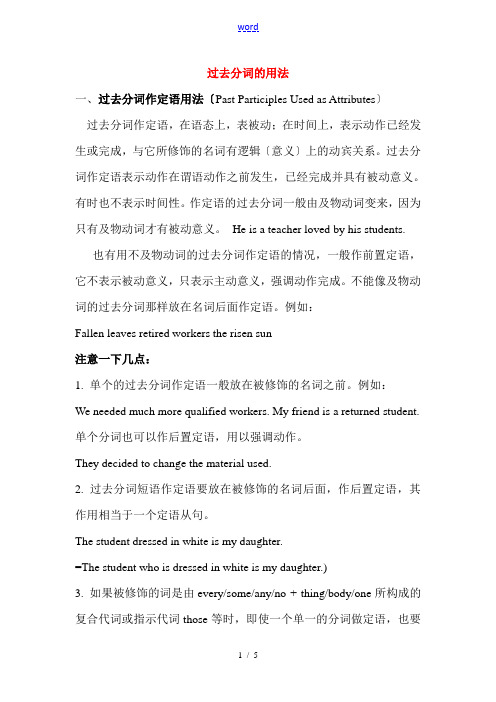
过去分词的用法一、过去分词作定语用法〔Past Participles Used as Attributes〕过去分词作定语,在语态上,表被动;在时间上,表示动作已经发生或完成,与它所修饰的名词有逻辑〔意义〕上的动宾关系。
过去分词作定语表示动作在谓语动作之前发生,已经完成并具有被动意义。
有时也不表示时间性。
作定语的过去分词一般由及物动词变来,因为只有及物动词才有被动意义。
He is a teacher loved by his students.也有用不及物动词的过去分词作定语的情况,一般作前置定语,它不表示被动意义,只表示主动意义,强调动作完成。
不能像及物动词的过去分词那样放在名词后面作定语。
例如:Fallen leaves retired workers the risen sun注意一下几点:1. 单个的过去分词作定语一般放在被修饰的名词之前。
例如:We needed much more qualified workers. My friend is a returned student. 单个分词也可以作后置定语,用以强调动作。
They decided to change the material used.2. 过去分词短语作定语要放在被修饰的名词后面,作后置定语,其作用相当于一个定语从句。
The student dressed in white is my daughter.=The student who is dressed in white is my daughter.)3. 如果被修饰的词是由every/some/any/no + thing/body/one所构成的复合代词或指示代词those等时,即使一个单一的分词做定语,也要放在被修饰词的后面。
Is there anything unsolved?There is noting changed here since I left this town.4. 单个过去分词前加一名词或副词,常用连字符将它们连接起来构成一个复合形容词,放在其修饰的名词前,作前置定语。
非谓语动词的用法详解
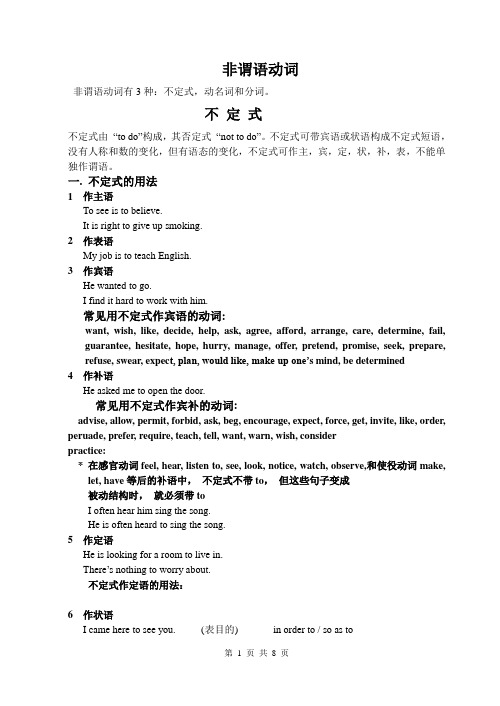
非谓语动词非谓语动词有3种:不定式,动名词和分词。
不定式不定式由“to do”构成,其否定式“not to do”。
不定式可带宾语或状语构成不定式短语,没有人称和数的变化,但有语态的变化,不定式可作主,宾,定,状,补,表,不能单独作谓语。
一. 不定式的用法1 作主语To see is to believe.It is right to give up smoking.2 作表语My job is to teach English.3 作宾语He wanted to go.I find it hard to work with him.常见用不定式作宾语的动词:want, wish, like, decide, help, ask, agree, afford, arrange, care, determine, fail, guarantee, hesitate, hope, hurry, manage, offer, pretend, promise, seek, prepare, refuse, swear, expec t, plan, would like, make up one’s mind, be determined4 作补语He asked me to open the door.常见用不定式作宾补的动词:advise, allow, permit, forbid, ask, beg, encourage, expect, force, get, invite, like, order, peruade, prefer, require, teach, tell, want, warn, wish, considerpractice:* 在感官动词feel, hear, listen to, see, look, notice, watch, observe,和使役动词make, let, have等后的补语中,不定式不带to,但这些句子变成被动结构时,就必须带toI often hear him sing the song.He is often heard to sing the song.5 作定语He is looking for a room to live in.There’s nothing to worry about.不定式作定语的用法:6 作状语I came here to see you. (表目的) in order to / so as toWe were excited to hear the news. (表原因)He hurried to the school (only) to find nobody there.(表结果7 疑问词+不定式,在句中起名词作用,可作主,宾,表He didn’t know what to say.How to solve the problem is very important.My question is when to start.8 作插入语To tell the truth, I don’t agree with you.to be sure to be frank to sum up to begin /start withto make matters worse to be brief二不定式的时态,语态1 一般式:表示的动作与谓语动作同时或在它之后发生He pretended not to know me when I met him in the street.2 进行式:表示动作发生时,不定式动作正在发生He pretended to be reading English when I entered the classroom.3 完成式:表示动作发生在谓语动作之前He is said to have learned English in Britain for a year.A railway is said to be being built now.No harm seems to have been done.四不定式的省略为避免重复可用to来代替前面的不定式,常出现在下列动词后expect, hope, wish, mean, prefer, care, forget, want, try 或出现在be glad, be happy, would like/love后eg: I haven’t been to Hong Kong, but I wish to.--- Would you come to the party?--- I’d love to, but…如果在省略不定式中含有be, have, have been 等系动词或助动词,这些词要保留。
非谓语动词现在分词和过去分词的用法
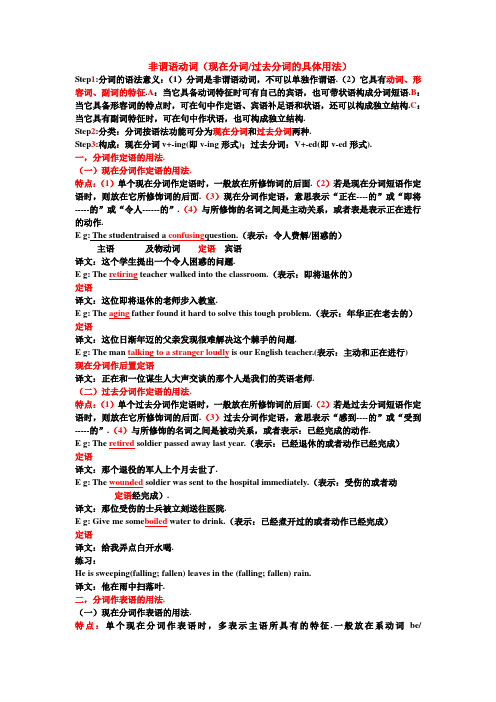
非谓语动词(现在分词/过去分词的具体用法)Step1:分词的语法意义:(1)分词是非谓语动词,不可以单独作谓语.(2)它具有动词、形容词、副词的特征.A:当它具备动词特征时可有自己的宾语,也可带状语构成分词短语.B:当它具备形容词的特点时,可在句中作定语、宾语补足语和状语,还可以构成独立结构.C:当它具有副词特征时,可在句中作状语,也可构成独立结构.Step2:分类:分词按语法功能可分为现在分词和过去分词两种.Step3:构成:现在分词v+-ing(即v-ing形式);过去分词:V+-ed(即v-ed形式).一,分词作定语的用法.(一)现在分词作定语的用法.特点:(1)单个现在分词作定语时,一般放在所修饰词的后面.(2)若是现在分词短语作定语时,则放在它所修饰词的后面.(3)现在分词作定语,意思表示“正在----的”或“即将-----的”或“令人------的”.(4)与所修饰的名词之间是主动关系,或者表是表示正在进行的动作.E g: The studentraised a confusing question.(表示:令人费解/困惑的)主语及物动词定语宾语译文:这个学生提出一个令人困惑的问题.E g: The retiring teacher walked into the classroom.(表示:即将退休的)定语译文:这位即将退休的老师步入教室.E g: The aging father found it hard to solve this tough problem.(表示:年华正在老去的)定语译文:这位日渐年迈的父亲发现很难解决这个棘手的问题.E g: The man talking to a stranger loudly is our English teacher.(表示:主动和正在进行)现在分词作后置定语译文:正在和一位谋生人大声交谈的那个人是我们的英语老师.(二)过去分词作定语的用法.特点:(1)单个过去分词作定语时,一般放在所修饰词的后面.(2)若是过去分词短语作定语时,则放在它所修饰词的后面.(3)过去分词作定语,意思表示“感到----的”或“受到-----的”.(4)与所修饰的名词之间是被动关系,或者表示:已经完成的动作.E g: The retired soldier passed away last year.(表示:已经退休的或者动作已经完成)定语译文:那个退役的军人上个月去世了.E g: The wounded soldier was sent to the hospital immediately.(表示:受伤的或者动定语经完成).译文:那位受伤的士兵被立刻送往医院.E g: Give me some boiled water to drink.(表示:已经煮开过的或者动作已经完成)定语译文:给我弄点白开水喝.练习:He is sweeping(falling; fallen) leaves in the (falling; fallen) rain.译文:他在雨中扫落叶.二,分词作表语的用法.(一)现在分词作表语的用法.特点:单个现在分词作表语时,多表示主语所具有的特征.一般放在系动词be/become/look/sound/smell/remain/seem/appear等后面.作表语的分词均为形容词.可以译成:“-----------的”.E g: The English speech contest is really exciting.(表示:令人兴奋的)表语译文:这次英语演讲比赛很令人兴奋.E g: The naughty baby is very tiring.(表示:令人累的)表语译文:这个调皮的孩子真是累人.E g: The food smells so inviting.(表示:令人诱惑的)表语译文:这食物闻起来很诱人.E g: This once-in-a-blue-moon experience is really thrilling.(表示:令人刺激的)译文:这次难得的经历真扣人心弦.(二)过去分词作表语的用法.特点:单个过去分词作表语时,多表示主语所处的状态.一般放在系动词be/ become/look/sound/smell/remain/seem/appear等后面.作表语的分词均为形容词.可以译成:“-----------的”.E g: I was bored by her endless bragging.(表示:感到枯燥、厌倦的).译文:她不停地吹嘘,我烦透了.E g: I’m really interested in making a speech in English in public.(表示:感到有趣的)译文:我对在公共场合用英文演讲非常感兴趣.E g: I felt confused about this matter.(表示:感到费解、迷惑的)译文:我对这件事情很费解.总结:并非所有的分词均可当形容词对待.有些分词不能翻译成“--------的”.Killed:不能译成“感到杀的”Killing:不能译成“令人杀的”Writing:不能译成“令人写的”Written:不能译成“感到写的”此类分词,只能置于be动词之后,不可置于连系动词(become/look/sound/smell/remain/seem/appear)等后面,不可视为是形容词,而视为动词的进行时或被动语态.E g: He was murdered last night.(表示:一般过去式的被动语态)译文:他昨晚被谋杀了.E g: I can’t believe you didn’t have a written contract.译文:我简直不敢相信,你居然没有一份书面合同.三,分词作宾语补足语的用法.(一)现在分词作宾语补足语的用法.特点:现在分词作宾语补足语时常用在感官动词和使役动词之后,现在分词一般强调动作正在进行,主动,与物有关.方法:(1)宾补的动词若为及物动词,后面一定接宾语,共同作宾补.(2)宾补的动词为不及物动词,一律用现在分词.(3)宾语与宾补之间为主动关系.(4)宾补的动作在逻辑上是由宾语来完成的.E g: I heard some girls gossiping about you.宾语补足语译文:我听到一些女孩子在说你的闲话.E g: I found him killing cockroaches宾语补足语译文:我发现他正在杀蟑螂.E g: I saw him coming out of the office just now.宾语补足语译文:我刚才看见他正在从办公室出来.(二)过去分词作宾语补足语的用法.特点:现在分词作宾语补足语时常用在感官动词和使役动词之后,过去分词一般强调被动,完成,与人有关.方法:(1)宾补的动词为及物动词,后面不可接宾语(2.)宾语与宾补之间为被动关系,宾补与前面的宾语构成动宾关系.(3)宾补的动作不是由宾语自身完成.E g: I found the cockroaches killed.(过去分词充当宾语补足语)译文:我发现那些蟑螂被人杀了.E g: I had my wallet robbed in the street this morning.(过去分词充当宾语补足语)译文:今天早上在街上我的钱包被人抢了.(三)由介词with引导的复合结构中,分词作宾语补足语的用法.特点:置于句首或句尾,常用来修饰句中的主语,以表示主语所处的状况,通常为大动作附带小动作时,大动作以句子的动词表示,而小动作则使用with复合结构.(1)with +宾语+宾补(过去分词充当).特点:宾语与宾补之间表示被动和完成.E g: He stood there with his arms folded.译文:他双臂交叉站在那里.E g: He sat there with his eyes closed.译文:他双眼闭着坐在那儿.(2)with +宾语+宾补(现在分词充当).特点:宾语与宾补之间表示主动和正在进行.E g: He talked to me with his legs shaking译文:他和我说话时两腿发抖.E g: A: Come on, Please give me some ideas about the project.B: Sorry. With so much work filling my mind, I almost break down.(3)with +宾语+宾补(动词不定式充当).特点:宾语与宾补之间表示将要发生或没有完成.E g: With a lot of difficult problems to settle, the manager felt worried all the time.译文:由于很多的难题没有得到解决,经理一直很担忧.(4)with +宾语+宾补(介词短语充当).特点:表示宾语所处的状态.E g: He talked to me with a pipe in his mouth.译文:他和我说话时嘴里叼着烟斗.四,分词作状语的用法.(一)现在分词作状语的用法.特点:(1)现在分词短语作状语时刻表示原因、方式、伴随、结果、或条件等.此时它的逻辑主语应与句子的主语保持一致.(2)现在分词一般式,若现在分词短语表示的动作与谓语表示的动作同时发生,或者紧接发生,也可在该短语前加上when或while; (3)现在分词的完成时,若现在分词短语表示的动作在谓语表示的动作之前发生.(4)若现在分词短语的逻辑主语(即句子的主语)发出该动作,则就是主动语态.(5)若现在分词短语的逻辑主语(句子的主语)承受了该动作,那么就用它的被动式.E g:We often provide our children with toys, footballs or basketballs,thinking that all children like these things.(现在分词在句中作伴随状语,而且句子的主语是thinking的执行者).译文:我们考虑到孩子们都喜欢这些东西,通常给孩子提供玩具;足球和篮球.E g: Daddy didn’t mind what we were doing, as long as we were together, having fun.(现在分词在句中作伴随状语,而且句子的主语we是having的执行者).译文:只要我们能在一起共享乐趣,爸爸不会介意我们在做什么.E g: The storm left, having caused a lot of damage to this area.(说明:分词的逻辑主语为the storm,故用现在分词表示主动,因为是造成破坏之后离开的,所以用现在完成时态,在句中作时间状语从句)可以改写为:After it had caused a lot of damage to this area, the storm left.E g:Having been separated from other continents for millions of years, Australia has many plants and animals not found in any other country in the world.(说明:separate from 与主句主语有被动的含义,并且先于主句谓语动词,因此用现在分词完成时的被动语态)E g: Oil prices have risen by 32percent since the start of the year, reaching a recor d$57.65 a barrel on April 4.(现在分词在句中作伴随状语)译文:自从今年开始油价已经上涨了32﹪,在4月份达到每桶$57.65这个记录.E g: The manager, having made it clear to us that he didn’t agree with us, left the meeting room.(现在分词的完成时态表示动作发生在主句的动作之前).E g: Whenever he was asked why he was late for class, he would answer careless, always saying the same thing.译文:无论什么时候他被问到为什么他会上课迟到,他总是粗心地答复,说着同样的话.E g:He is a student at OxfordUniversity, studying for a degree in computer science.(现在分词在句中作伴随状语)E g: He was busy writing a story,only stopping once in a while to smoke a cigarette.(现在分词在句中作伴随状语)译文:他那时忙于写一个故事,只是偶尔停下来抽支烟.E g:Having been shown around the Water Cube, we were then taken to see the Bird’s Nest for the 2008 Olympic Games.译文:我们参观了水立方后,又被带去参观了为20XX年奥运会准备的鸟巢.E g: Not realizing that he was in great danger, Eric walked deeper into the forest. (主语Eric与realize 构成主动关系,因此用realizing,v-ing形式前加not表示否定)练习题:1,in the queue for half an hour, the old man suddenly realized he had left the cheque in the car.A: Waiting B: To wait C: Having waited D: To have waited2, in the fields on a March afternoon, he could feel the warmth of spring.A: To walk B: Walking C: Walked D: Having walked3, their hats into the air, the fans of the winning team let out loud shouts of victory.A: To throw B: Thrown C: Throwing B: Being thrown4, We had an anxious couple of weeks for the results of the experiment.A: wait B: to be waiting C: waited D: waiting.5, that she was going off to sleep , I asked if she’s like that little doll on her bed.A: Seeing B: To see C: See D: Seen.6, The wild flowers looked like a soft orange blanketthe desert.A: Covering B: Covered C: Cover D: To cover.(二)过去分词作状语的用法.特点:(1)过去分词短语作状语修饰谓语动词,说明其发生的情况,可以放在句首其强调作用,也可放在句中、句末,它的逻辑主语须与句子的主语保持一致.(2)过去分词一般表示动作已完成,只有一般式.(3)过去分词表示被动和完成E g:Dressed in a white uniform, he looks more like a cook than a doctor.说明:当状语从句的主语和主句主语相一致且谓语包含动词be的某种形式时,可省略从句的主语以及动词be. 恢复原句:When he is dressed in a white uniform, -----------.译文:穿着白色的制服,他看上去更像是个厨师而不像医生.E g: When offered help, one often says “ Thank you.”O r“It’s kind of you.”译文:当被提供了帮助时,人们常说:“谢谢”或“你真好”.E g: Faced with so much trouble, we failed to complete the task on time.说明:be faced with 表示:“面临,面对.”作原因状语.译文:由于面临很多的困难,我们未能按时完成这项工作.E g: Blamed for the breakdown of the school computer network, Alice was in low spirits.(作原因状语).练习题:1,No matter how frequently , the works of Beethoven still attract people all over the world.A: Performed B: Performing C: to be performed D: being performed2,The flowers his friend gave him will die unlessevery day.A: watered B: watering C: water D: to water3, by a greater demand of vegetables , farmers have built more green houses.A: Driven B: Being driven C : To drive D: Having driven4, To learn English well, we should find opportunities to hear Englishas much as we can.A: speak B: speaking C: spoken D: to speak5, It is one of the funniest things on the internet so far this year.A: finding B: being found C: to find D: found(三)分词结构-----动词变化1,若一句中有两个动词同时存在,彼此一定要有连接词相连.E g: He studied very hard but failed the exam.2, 若两个动词没有连接词相连,注意下列变化原则.(1) 若两个动词所代表的动作时同时发生时,第二个动词一定要变成现在分词;若该动词是be动词,变成现在分词being 之后要省略.E g: He sat in the corner reading books.(他一面坐在角落,一面看书,动作同时发生,因此read应该变成现在分词)译文:他坐在角落看书.E g: Don’t sit there doing nothing. Come and help me with this table.译文:别坐那儿无所事事,过来帮助我收拾一下桌子.E g: He came home was tired.第一步:变成:He came home being tired.第二步:变成:He came home tired.(说明:他一面回家,一面感到累,故came与was tired同时发生.由于was是be动词,变成being之后应给予省略)译文:他回到家感到很累.E g: He left young and came back old.译文:他少小离家老大回.E g: We are born equal.译文:我们生而平等.(2)若两个动词所代表的动作并非同时发生,而是有先后次序时,第二个动词就要变成“to+动词原形)形成的不定式短语,作目的状语.E g: He stood up to smoke a cigarette.译文:他站起来抽烟.E g: He rushed here to tell me the story.译文:他赶到这里来告诉我这个故事.(3)若有两个动词有逗号隔开,而无连接词时,就不必考虑动词所代表的动作先后发生的次序,第二个动词一定要变成现在分词.E g: He left home at six in the morning, arriving here about four in the afternoon.译文:他早上6点离开家,约下午4点抵达此地.E g: He ran away quickly, looking as if something terrible had happened.译文:他很快的跑开了,看起来好像发生了什么可怕的事.(四)分词结构-----单句化简法.两个句子在一起,若无连接词相连时,往往第一个句子要化简,变成分词短语.法则如下:(1)两句的主语相同时,被化简的句子的主语要删除,若主语不同时要保留.(2)之后的动词要变成现在分词.(3)若该动词为be动词时,变成现在分词being之后,可给予省略,但亦可不予省略,以强调“因为------”的意思.E g: He has nothing to do, he feels bored.改正:化简第一个句子第一步:删除相同的主语he第二步:其后动词has变成现在分词having.最简化为:Having nothing to do , he feels bored.译文:他没有事情可做,所以觉得无聊.E g: He was sick of studying, he ran away from home.改正:化简第一个句子第一步:删除相同的主语he第二步:其后动词was变成现在分词being,然后给予省略.最简化为:Sick of studying, he ran away from home.译文:他厌倦学习,所以离家出走了.E g: The sun set, the cowboys rode back to the ranch.改正:化简第一个句子第一步:因为两个句子的主语不同,故要保留.第二步:其后动词set变成现在分词setting.最简化为:The sun setting, the cowboys rode back to the ranch.译文:夕阳西下,牛仔们刺马回到牧场(五)使用单句化简法时应注意事项.(1)变成否定分词结构时,not要置于分词前.E g:Not satisfied with result, he decided to try again.译文:他不满意此结果,决定再试一次.(2)句中有助动词do/does/did时,可直接删除.E g: He didn’t intend to see her, he left early.-----Not intending to see her, he left early.译文:他不打算见她,便提前离开了.(3)句中有完成时助动词has /have/had要视为动词而变成现在分词having.E g: He had done the work, he felt very happy.--------having done the work , he left happy.译文:他做完了这个工作,觉得很高兴.E g: I have not seen her for ages, I miss her very much.-------Not having seen her for ages, I miss her very much.译文:好久没有见面了,我非常想念她.(4)主语不同时,所形成的分词短语,成为分词的独立主格结构.所谓分词的独立主格结构,就是独立修饰不同主语的分词结构.在句中只能做状语,表示条件;时间;原因;伴随情况.E g: This being the case, you’d better be more careful.(解释:this being the case原为this is the case,但如此一来,本句与you’d better be more careful 无连接词相连.故将第一个句子化简为分词短语.由于主语不同,故给予保留,之后的动词is变成现在分词being, being the case 独立修饰不同主语this,故称为分词的独立主格结构).译文:这样的话,你最好多加小心.E g: All things considered, I decided to major in business administration.译文:全盘考虑后,我决定主修企业管理.E g: All the work finished, you can go home.译文:所有工作都做完了,你可以回家了.E g: Weather permitting , we are going to have a picnic tomorrow.译文:若天气许可,我们明天就去野餐.(六)分词短语------定语从句化简法.1,在限定性定语从句中、(即关系代词之前无逗号)中,若关系代词作主语时,可化简成分词短语,法则如下:(1)删除关系代词(2)其后动词变成现在分词.(3)若该动词为be动词,变成现在分词being之后,可给予省略.E g: The man who is talking to Mary over there is my father.第一步:将who删除第二步:将who之后的is变成现在分词being第三步:再将being省略.上句可简化成:-----------The man talking to Mary over there is my father.译文:那边那位正在和玛丽说话的男士是我爸爸.2,在非限制性的定语从句中(即关系代词之前有逗号)通常不得化简为分词短语.E g: I like Tom, who is talking to Mary.-------不能变成I like Tom, talking to Mary.3, 不过在非限制性的定语从句结构为“关系代词+be+名词”时,则仍可化简,从而形成同位语.E g: John, who is a good friend of mine, studies hard.------John, a good friend of mine , studies hard.译文:约翰,我的一个好朋友,学习很用功.(七)分词短语------状语从句化简法.Once; when; while; if ;unless; though等六个连接词所引导的状语从句中,若主语与主句中的主语相同时,亦可化简为分词结构,法则与单句化简完全相同.注意:once; if; unless所引导的状语从句若化简为分词短语,多限于“主语+be+分词/形容词”的结构;而when; while; though则不限于此.E g: If I am free, I’ll go with you.-------If free,I’ll go with you.译文:如果有空,我将和你一起去.E g: Though he was seriously injured, he was not at all daunted.-----Though seriously injured, he was not at all daunted.译文:虽然受伤很严重,他一点都不畏惧.E g: Once I am available, I’ll let you know the result.-----O nce available, I’ll let you know the result.译文:一旦我有空,我会告诉你结果的.E g: Once I have money, I’ll buy a new car.------不能转化为Once having money, I’ll buy a new car.(八)少数现在分词可当成介词使用.(1)including 包含/包括=inclusive of ;(2)excluding =exclusive of除外;(3)considering 考虑;(4)regarding关于;(5)concerning=about=on关于E g: Considering his performance, he can be a good teacher.译文:从他的表现来看,他可以当个好老师.E g: He wrote an article regarding environment pollution.译文:他写了一篇有关环境污染的文章.(九)独立分词短语的使用.特点:某些独立分词短语有副词的功能,通常置于句首,修饰整个句子.常见的分词短语有:generally speaking(一般来说); judging from(从----判断); frankly speaking(坦率地说); considering everything(把一切考虑在内); strictly speaking(严格地说); talking of (谈到/谈及); according to(根据); seeing that+从句----------(既然);given that+从句---------(考虑到).E g:Generally speaking, the more expensive the camera, the better its quality.E g:Strictly speaking, he is not good enough.E g: Judging from his appearance, he seems to be rich.E g: Talking of the devil, he will appear.E g:According to John, the fire broke out at ten in the morning.E g:Seeing that you have no time, I’ll have Peter replace you.E g: Given that you had very little help, I think you did very well.(十)与使役动词有关的重要分词短语的句子.1,I started the ball rolling. 我给那件事开个头.2,The news set my heart throbbing.这个消息使我心悸不已3, I am sorry to have kept you waiting.我很抱歉让你久等了.4, I couldn’t make myself understood. 我无法让别人听懂我的话. 5, I had my shoes repaired.我把我的鞋拿去修好了.6, He got a new suit made.他订做了一套西服.7, You should leave it unsaid.你应该别提这件事情.8, I like my eggs half boiled.我喜欢吃煮的半熟的鸡蛋.9, I had my watch stolen.我的表被偷了.。
高中英语过去分词用法详解
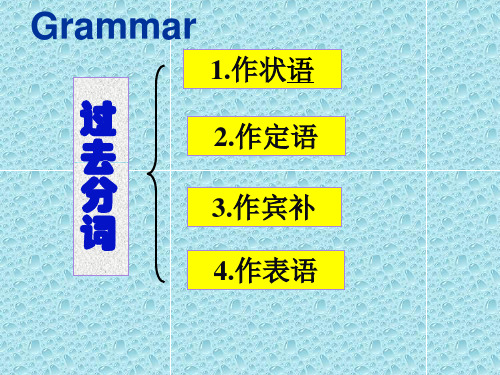
3. Well known for his expert advice, he received many invitations to give lectures.
→Because he was well known for his expert advice, he received many invitations to give lectures., 且与主语 之间存在着被动关系。过去分词作 状语可表时间、原因、 让步、 结果、 方式、 条件等。
观察下列的句子:
Once published, his works (=Once his works was published, ) became famous for the absence of rhyme at the end of each line.
3) If _tr_a_p_p_e_d_ in a burning building, you should send for help. 4) Although _s_h_o_t in the leg, he continued firing at the police.
二、过去分词作定语 过去分词作定语与其所修饰的词之间
B. Seen
4. 从太空看, 宇航员看不到长城。
__A__ from the space, the astronaut
can not discover the Great Wall.
A. Seeing
B. Seen
Difference between the Present Participle and the Past Participle _U_s_e_d_for a long time, the book looks old. 由于用了很长时间,这本书看上去很旧. _U_s_i_n_g_ the book, I find it useful. 在使用的过程中,我发现这本书很有用. _L_o_o_k_i_n_g_ at her, he jumped with joy. _L_o_o_k_e_d_at by her, he jumped with joy.
